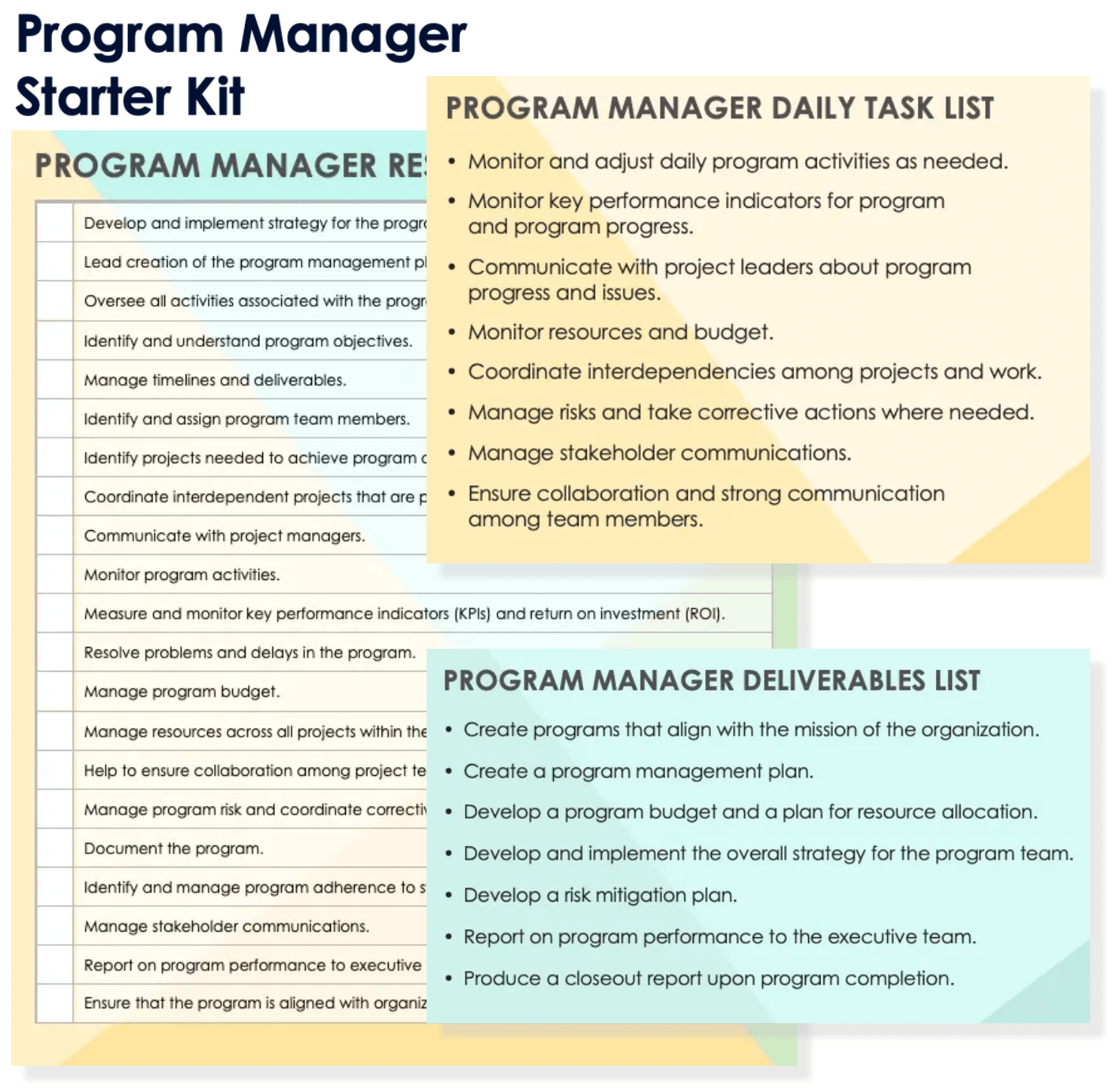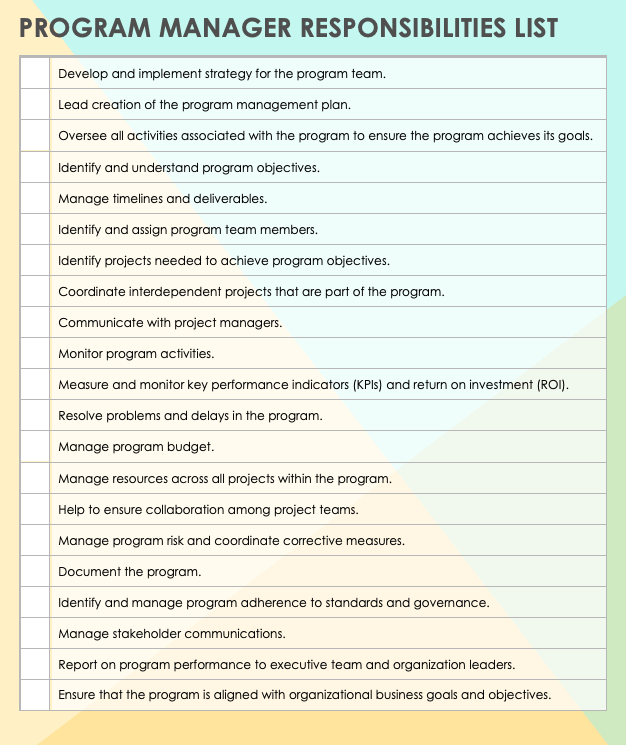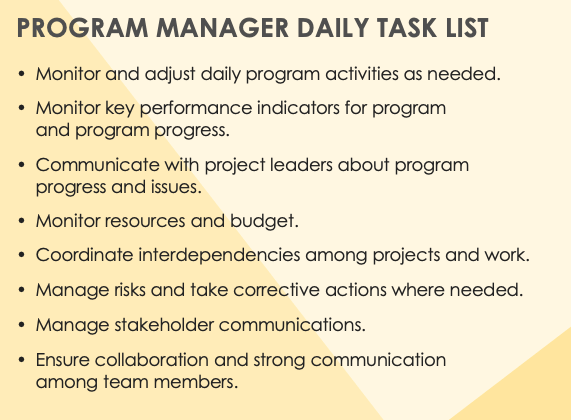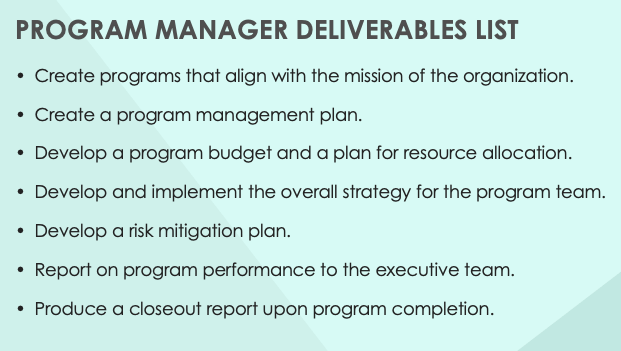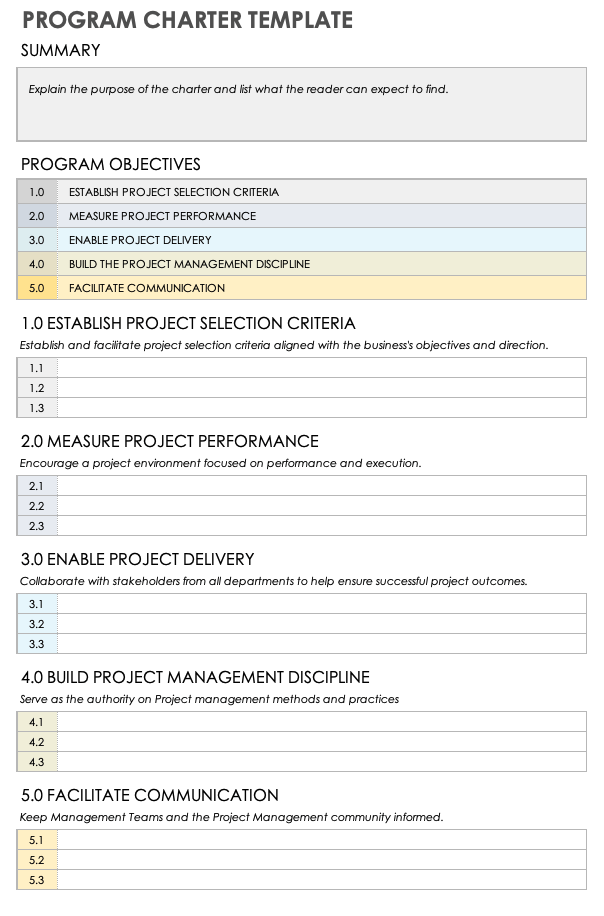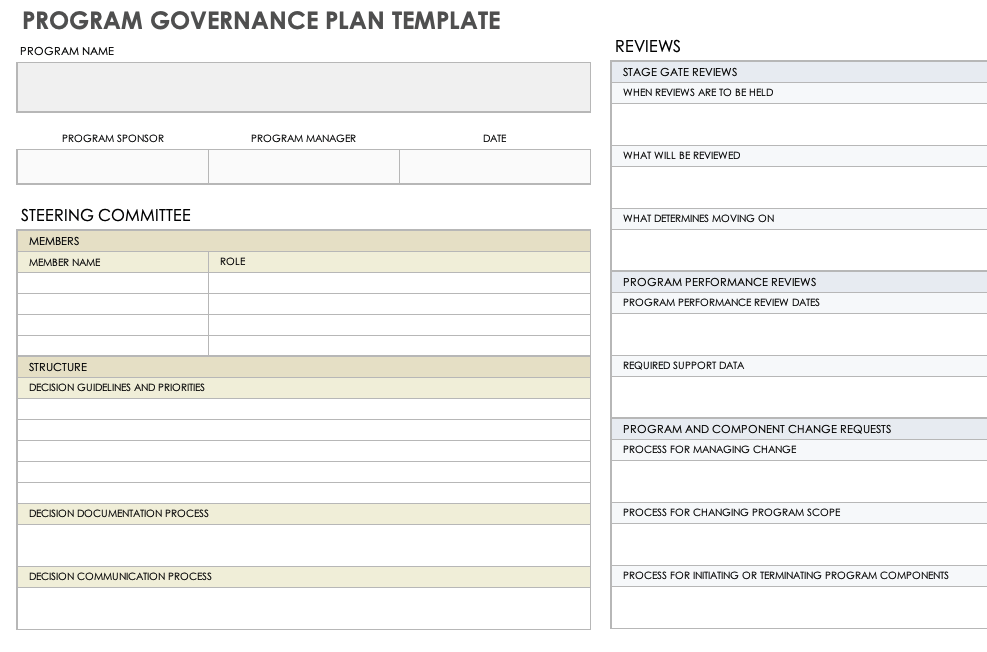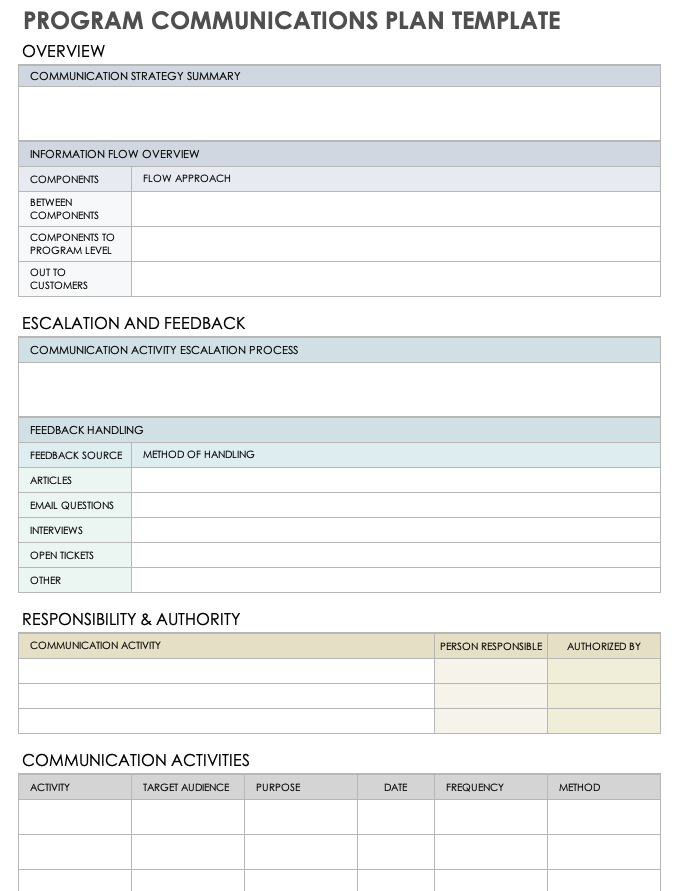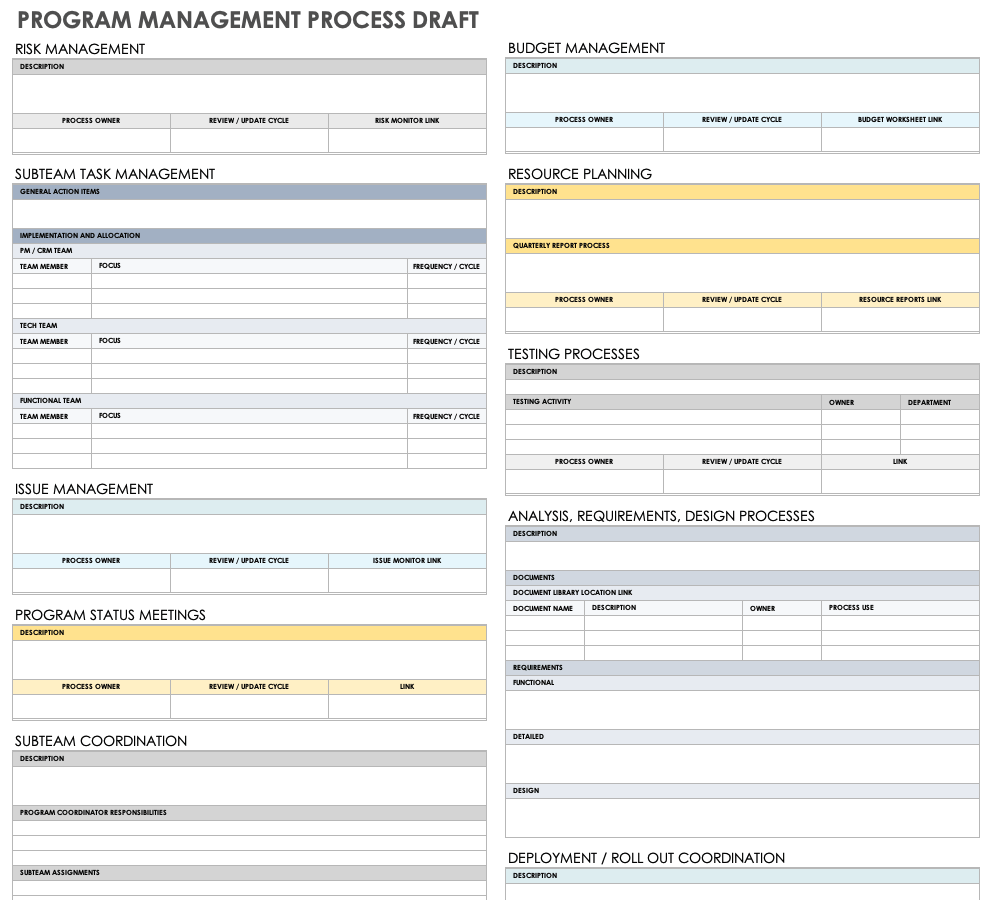What Is a Program Manager?
A program manager guides and oversees a program, which may include several projects and areas of work within an organization. The program manager makes sure all of that work aligns with the organization’s overall goals.
What Are the Main Responsibilities of a Program Manager?
A program manager is responsible for all program-level strategic planning, as well as for managing how projects depend on each other. Plus, the manager also manages the overall budget and helps team members work together.
Here is a detailed list of some of the main responsibilities for a program manager:
- Develop and implement strategy for the program team.
- Lead creation of the program management plan.
- Oversee all activities associated with the program to ensure the program achieves its goals.
- Identify and understand program objectives.
- Manage timelines and deliverables.
- Identify and assign program team members.
- Identify projects needed to achieve program objectives.
- Coordinate interdependent projects that are part of the program.
- Communicate with project managers.
- Monitor program activities.
- Measure and monitor key performance indicators (KPIs) and return on investment (ROI).
- Resolve problems and delays in the program.
- Manage program budget.
- Manage resources across all projects within the program.
- Help to ensure collaboration among project teams.
- Manage program risk and coordinate corrective measures.
- Document the program.
- Identify and manage program adherence to standards and governance.
- Manage stakeholder communications.
- Report on program performance to executive team and organization leaders.
- Ensure that the program is aligned with organizational business goals and objectives.
Program Manager Starter Kit
This starter kit will help you understand the main duties of a program manager. The kit includes downloadable PDFs that include a list of program manager responsibilities, as well as a list of common daily tasks for a program manager.
Download Program Manager Starter Kit
You can also download a wide range of free program management templates to get started.
Program Manager Responsibilities List
Download Program Manager Responsibilities List — Adobe PDF
Use this free, downloadable document as a record of all the common responsibilities of a program manager listed in the previous section. The list comes formatted as a checklist, so you can check off items throughout the program lifecycle.
Program Manager Daily Task List
Download Program Manager Daily Task List — Adobe PDF
This document provides a sample daily task list for a program manager, as listed below:
- Monitor and adjust daily program activities as needed.
- Monitor key performance indicators for program and program progress.
- Communicate with project leaders about program progress and issues.
- Monitor resources and budget.
- Coordinate interdependencies among projects and work.
- Manage risks and take corrective actions where needed.
- Manage stakeholder communications.
- Ensure collaboration and strong communication among team members.
Program Manager Deliverables List
Download Program Manager Deliverables List — Adobe PDF
This document provides you with a sample list of deliverables that program managers often need to complete during the program lifecycle. Download and save the document, and check off items on the list as you complete them.
The sample deliverables in this template are as follows:
- Create programs that align with the mission of the organization.
- Create a program management plan.
- Develop a program budget and a plan for resource allocation.
- Develop and implement the overall strategy for the program team.
- Develop a risk mitigation plan.
- Report on program performance to the executive team.
- Produce a closeout report upon program completion.
Program Charter Template
Download Program Charter Form Template — Microsoft Excel
Program managers and other leaders can use a program charter template to create an overview of the program and outline its key elements. This program charter template also includes space to approve the program parameters and get authorization for the program to begin.
Program Governance Plan Template
Download Program Governance Template — Microsoft Excel
This template is designed for program leaders and governance committees that need to outline guidelines for program decision making. You can use the template to plan stage-gate and overall program performance reviews, and to provide details on when reviews will take place.
Program Communications Plan
Download Program Communications Plan Template — Microsoft Excel
Use this template to create a communications plan that includes a summary of your communications strategy for the program. The template also allows you to detail your communication approach to fit each part of the program, and to assign team members responsible for certain communications.
Program Management Process Draft Template
Download Program Management Process Draft Template — Microsoft Excel
This program management planning template is designed to help you quickly create a program plan in a spreadsheet format. You can edit the template to include different sections depending on the needs of and specific elements included in your program.
Program Manager Priorities
A program manager must always assess how the individual projects within the program are progressing. The program manager must also think strategically about assigning resources, and consider whether other projects should be ended entirely.
The Bottom Line: Managing Costs and Budgets of Programs
One of a program manager’s most important duties is monitoring project costs and budgets and keeping them under control. Organization leaders expect that programs will move forward smoothly and that there won’t be any surprise, additional costs.
A good program manager will be able to spot duplication and inefficiencies among projects. Then, they will work to streamline and eliminate duplication, which saves team members time and the company money.
Program Manager vs. Project Manager
A project manager is responsible for managing a team to provide a defined deliverable. A program manager is a more strategic role — they coordinate many projects that combine to meet broader business goals.
Project and program managers share some roles and skills: They both need to be able to make plans, delegate tasks, and think critically, and must be exceptionally organized and able to oversee many moving parts.
But, a project manager oversees a defined project, with defined goals and a defined endpoint. A program manager oversees broader work that involves a number of different projects, and will likely involve broader, more strategic organizational goals. Program managers also often oversee a program that may stretch on for years.
You can learn more about the differences between programs and projects in our guide.
This table outlines some of the differences between a program manager and a project manager:
| Program Manager | Project Manager |
|---|---|
| Provides the roadmap or framework to integrate many projects | Manages the day-to-day tasks of a single project |
| Manages ongoing, long-term programs | Manages short-term projects with definitive timelines that formally close upon completion |
| Focuses on strategy | Focuses on tactical and technical details |
| Provides a business outcome | Provides a concrete deliverable |
| Impacts overall business revenue | Works with a single budget |
| Manages scope, schedule, budget, and plan | Manages scope, schedule, budget, and plan |
Program Coordinator vs. Program Manager
A program manager oversees and guides an entire program. A program coordinator generally oversees the day-to-day administrative operations of a program, and often reports directly to the program manager.
How to Become a Program Manager
You can learn program management skills through education, training, and direct experience. You’ll need to learn project and program management methodologies, and also to be organized, task-focused, and a natural leader and team builder.
A program manager needs to have technical and tactical skills, and also have an ability to think strategically and focus on an organization’s long-term goals.
The salary range for program managers is generally between $80,000 and $125,000 per year. Those salaries are generally higher in larger cities, and in industries like information technology and software development. As of May 2022, Glassdoor reports the current median total pay for program managers in the U.S. is $98,580 per year.
Beyond geography and type of industry, program managers can expect higher salaries if they do the following:
- Earn a project management or program management certification from the Project Management Institute.
- Acquire additional business skills beyond program management.
- Have extensive experience working as a project or program manager.
Program managers should develop the following skills to become successful:
- Communicate the big picture or vision to everyone consistently.
- Be proactive in resolving challenges.
- Set realistic goals and timelines.
- Advocate for simplicity and common sense.
- Maintain the ability to work with others.
- Gain a clear understanding of the business needs and goals.
- Clearly articulate the program scope.
- Delegate as necessary.
- Drive movement toward business goals and change.
- Seek commitment from key stakeholders.
- Arm the team with tools and knowledge.
- Manage uncertainty and conflict.
Program Management Certifications and Training Courses
The Project Management Institute (PMI) offers certifications and training for both project and program management. These certifications focus on the core competencies for success in each area.
PMI is the recognized leader in specialized business certification programs, which includes the Project Management Professional exam (PMP® exam) and the Program Management Professional certification class (PgMP® certification). In order to be eligible for either exam, you must have completed several thousand hours of on-the-job work as a project or program manager.
PMI also offers A Guide to the Project Management Body of Knowledge (PMBOK® Guide), a widely used reference that includes protocols and rules for project, program, and portfolio management.
Educational Opportunities for Program Managers
You can learn much about project and program management through PMI programs. There are also other educational programs that can help you become a better project or program manager.
In general, these courses will teach you elements of business leadership, management, certain software programs, and organizational skills.
For example, the University of California at Santa Cruz extension offers the only discipline of study in program and project management in Silicon Valley. UC-Santa Cruz designed its program to complement academic study with the PMI certification courses. Most of the instructors are working project or program managers.
You can also check your local community or four-year college to see what courses they offer.
Job Searching: What Top Recruiters Look for in a Program Manager
Many program managers have deep experience in project management. That doesn’t mean all project managers are good program managers. Recruiters looking for program managers value skills in planning and leadership. They also want people at ease working with top executives.
“Many project managers look up to program managers and aspire to be in their shoes one day,” says Janis Strathearn, a Principal at the Vancouver-based JKS Talent Network, Inc. Still, she adds, “That is not every project manager’s career path. Business today employs a new level of thinking and management approach at the program level. The person who is good as a project manager may not be proficient as a program manager. Program management may not be for everyone.”
This is because program managers need executive-level authority and experience to manage multiple projects. And, they must pay close attention to the organization’s budgetary and long-term financial goals. “A project manager may grow into those skills, but will need to seek and take opportunities to use and grow their strategic skills as well,” Strathearn says.
Paula Dieli, a software industry executive and author of Get on Track: How to Build, Run, and Level Up Your Program Management Office, says she especially looks for “soft” or “people” skills in program managers.
“You can’t teach somebody how to get along with people,” she says. “You can't teach somebody how to be that sort of likable person. That ability to get people to follow along.” But, that’s vital for a good program manager, she says.
Role of a Program Manager in Software Development
A company might start a number of projects to develop various parts of a piece of software. The program manager ensures that the program over all those projects effectively coordinates the projects to result in the best possible software product.
Streamline Program Management Activities with Resource Management in Smartsheet
Resource Management by Smartsheet is a powerful resource management software that helps to effectively manage the who, the what, and the when behind projects.
With Resource Management by Smartsheet, you can more easily build the best team for a project, keep project schedules and budgets on track, and confidently forecast business needs.
When teams have clarity into the work getting done and by whom, there’s no telling how much more they can accomplish in the same amount of time. Watch a free demo to learn more about Resource Management by Smartsheet.


